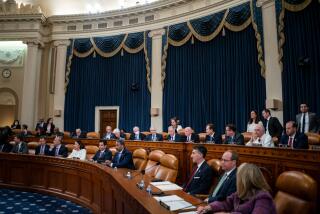Gay Couples Can’t File Joint Returns in D.C.
- Share via
WASHINGTON — The District of Columbia Tax and Revenue Office ruled Tuesday that same-sex couples married in Massachusetts could not file joint tax returns here, averting a showdown with conservatives in Congress who had said they might review the city’s budget if the decision went the other way.
The tax office based its decision on the federal Defense of Marriage Act, passed in 1996, that defines marriage as “a legal union between one man and one woman as husband and wife.” Federal law -- including the Internal Revenue Code -- has used that definition of marriage since the measure was passed.
For the record:
12:00 a.m. May 6, 2005 For The Record
Los Angeles Times Friday May 06, 2005 Home Edition Main News Part A Page 2 News Desk 2 inches; 84 words Type of Material: Correction
Same-sex couples -- An article in Wednesday’s Section A about a ruling that a same-sex couple married in Massachusetts and living in Washington, D.C., was not eligible to jointly file a local tax return said Washington was second to San Francisco in the number of same-sex couples living together. According to an analysis of 2000 census figures done by the Human Rights Campaign and the Urban Institute, Washington is second to San Francisco in the percentage of same-sex couples among all couples living together.
In a four-page ruling, the city’s chief financial officer, Natwar M. Gandhi, ruled that because a same-sex couple could not file a joint federal tax return, the couple could not file a joint district return.
Edward G. Horvath and Richard G. Neidich, who were legally married in Massachusetts in June after 24 years together, had sought a 2004 filing extension while they awaited the tax office’s decision.
“If you live here in D.C., you get used to being crushed,” Horvath said Tuesday. “We have so few rights, and we’re under the thumb of federal policies in ways people don’t even know.”
City Atty. Gen. Robert J. Spagnoletti had told Horvath and Neidich that they could file a joint return in Washington “if they hold a good-faith belief that they are a validly married couple under the laws of Massachusetts” -- pending a decision from the Office of Tax and Revenue.
That announcement kicked up warnings from Congress about the financial consequences for the city if it used the tax code to grant rights to same-sex couples.
Sen. Sam Brownback (R-Kan.), head of an appropriations subcommittee that has oversight of the city’s budget, issued a warning to Mayor Anthony A. Williams and Gandhi at a recent committee hearing.
“I was hopeful we weren’t going to be confronting this issue. But it appears there will need to be a review and a discussion,” Brownback said, prompting speculation that he intended to scrutinize Washington’s budget should the tax office accept the joint filing.
A spokesman for Brownback declined to clarify the comment.
Horvath said he understood its meaning. “He’s threatened to starve D.C. to death for social issues,” he said. “If a tax filing prompts this type of threat, anything can set the man off.”
Washington’s budget, by law, must be approved by Congress. Congress also must approve laws created by the City Council and can pass its own laws for the city -- much like a state legislature would have control over the laws of its cities and towns.
Congress has used its budget power before to limit the actions of the local government, preventing Washington from instituting a sterile-needle exchange program for intravenous drug users and from allowing distribution of marijuana to cancer patients.
Unlike residents of states, those who live in the District of Columbia do not have voting representatives in the House or Senate; Congress even has passed legislation banning them from lobbying for voting representation.
“There is a careful balance that the mayor strives for between the wishes and values of the residents of the city and the members of Congress,” said the mayor’s press secretary, Vincent Morris. “It’s a difficult balance that no other mayor has to maintain.”
Representatives of conservative groups said they believed that the city should abide by what they perceived was a national outcry against same-sex marriage, which has been banned in 18 states.
“Sen. Brownback was speaking the opinion of the rest of the country,” said Michele Combs, the director of communications for the Christian Coalition. “Since most of the money for D.C. comes from the federal government, then the federal government has a say-so.”
District City Council member Jim Graham, who aided the couple in their quest for answers about their tax-filing status in Washington, was outraged by Brownback’s statements.
“Answering a legitimate question is not creating a gay-marriage law,” Graham said.
It is the city’s “colonial status” under a conservative Congress that makes the nation’s capital -- which is second only to San Francisco in the number of gay and lesbian couples living together -- dangerous terrain to fight the same-sex marriage war, said Richard J. Rosendall, vice president for political affairs at the Gay and Lesbian Activist Alliance of Washington.
“Because of the special relationship with Congress, we’re not in a position to be on the leading edge of a fight,” he said. “What this couple wanted to do is the political equivalent of sailing down the Potomac on a flaming barge.”
But for Horvath and Neidich, the fight was worth fighting. “We posed a reasonable question,” Horvath said, “and if they followed the rule of law, we have no problem with the District of Columbia giving a reasoned interpretation of the law.”
Horvath said that they were not going to appeal -- and like many other married couples who file individually, “we’ll probably get a few more dollars back.”
More to Read
Sign up for Essential California
The most important California stories and recommendations in your inbox every morning.
You may occasionally receive promotional content from the Los Angeles Times.













